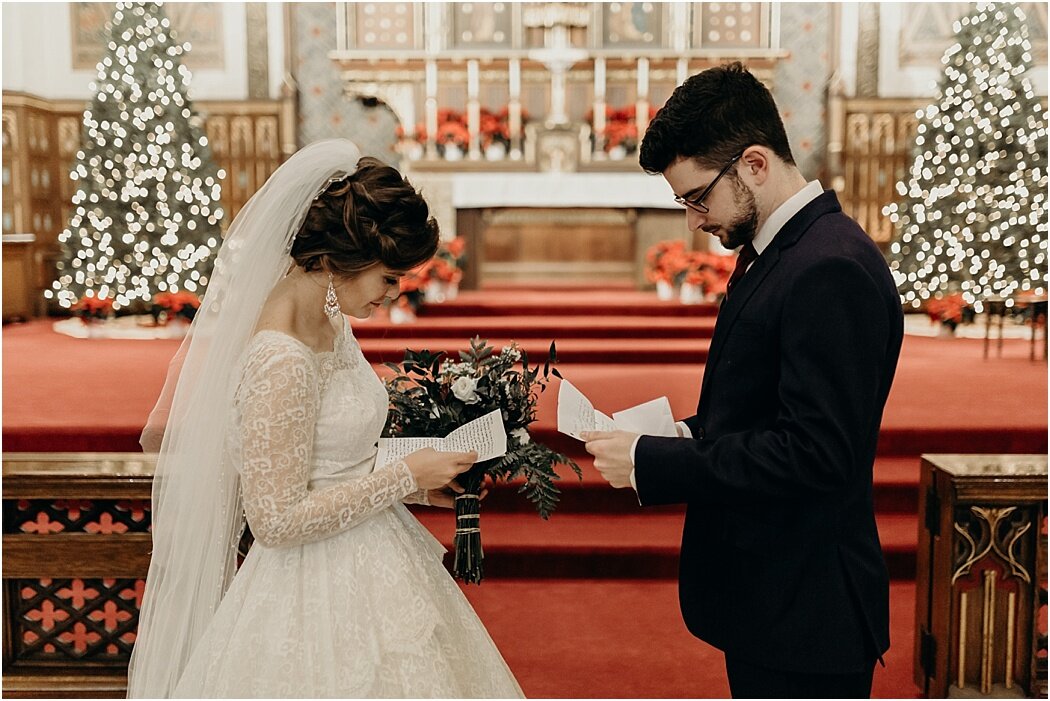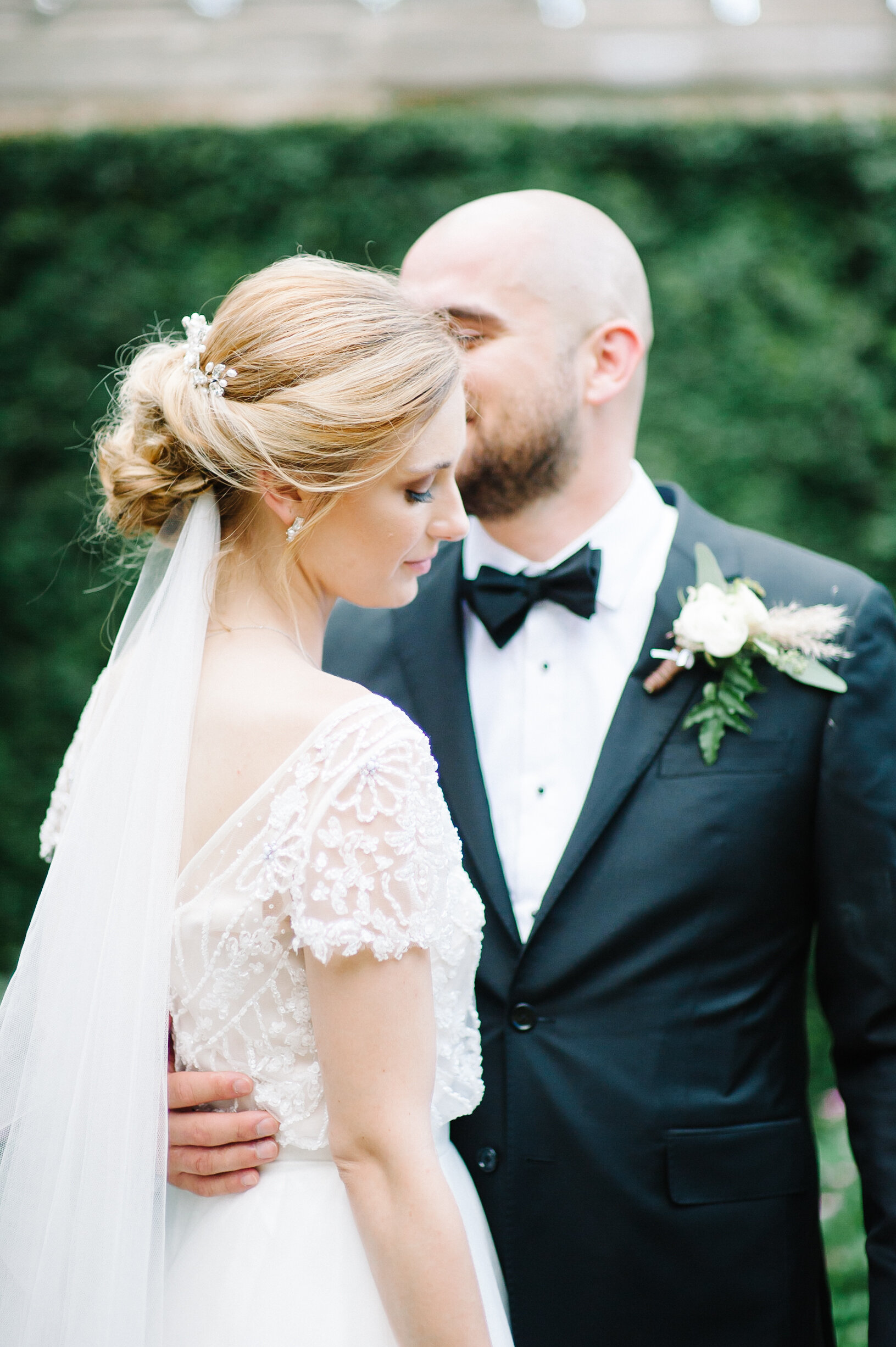Liturgical Living for Catholic Couples
/ANDI COMPTON
Growing up, I never saw the seasons of the Church outside of the Mass. The priest changed colors occasionally, the Church was beyond crowded on Christmas and Easter, and every year Ordinary time seemed to go on forever. As a young adult, I was fascinated to learn about the different ways saints are venerated and celebrated throughout the world. I soon discovered liturgical living.
The concept of Liturgical Living is simple: make the seasons of the Church come alive in your domestic church.
PHOTOGRAPHY: SARAH ASCANIO PHOTOGRAPHY, SEEN IN NATASHA + TIM | NEW YEAR’S WINTER WATERCOLOR WEDDING
Over the past twelve years, my husband and I have tried many different traditions and celebrations in our marriage, in our home, and with our children; I share some of our favorites of the Liturgical seasons below:
Ordinary time
Decorate the home with greenery in a vase on the mantle, on the table, or in the windows. Some years we hang a wreath of greenery on our doorway as well.
Celebrate the saints’ feast days. Our go-to celebration includes reading a short blurb about the saint or feast day during dinner, and either cooking a dish from the saint’s home country, where they are regionally celebrated, or creating a dessert and trying to tie it in (ie., angel food cake for Guardian Angels). Some great saints to celebrate are St. Francis de Sales, St. John Bosco, St. Thomas Aquinas, St. Agatha, Sacred Heart of Jesus, Corpus Christi, Immaculate Heart of Mary, St. Benedict, Sts. Peter and Paul, St. Kateri Tekakwitha, St. Dominic, The Transfiguration, St. Lawrence, St. Maximillian Kolbe, The Assumption, The Coronation of Mary, St. Monica, St. Augustine, St. Teresa of Kolkuta, St. Therese, Guardian Angels, Our Lady of the Rosary, St. Luke, and St. Cecilia.
Advent
During our first married Advent, we hosted a Church New Year Party. I decorated with purple and pink and made the atmosphere festive. Unfortunately I fell asleep during the party because I was pregnant--true story. I wish I could tell you if the guests enjoyed it!
Wait to put up Christmas decorations. We set up our tree when advent begins and use it as a Jesse tree. Each night we read one or two Bible stories to journey through salvation history from Adam to Jesus. We begin to turn on the tree’s lights on St. Lucy’s Day (December 13), and we put the ornaments up on the 24th. Some years we also wind purple and pink ribbons on the tree.
I created an 8x10 Advent printable that hangs in a frame on our front door until the 24th when it gets swapped for a Christmas wreath.
Celebrate Our Lady of Guadalupe. Some areas will have mananita Mass, but if you can’t find one nearby, you can celebrate the day with a trip to visit a parish with an Our Lady of Guadalupe image and indulge in your favorite Mexican food.
Purchase an Advent wreath and a set of candles. Every night before dinner prayers we shut off the kitchen lights and light the candles while singing “O Come, O Come, Emmanuel” and then say prayers.
Place a nativity in your home. There are so many beautiful options of nativity scenes! I know friends who collect nativities wherever they travel; others have the Fontanini collection and add a piece every year.
Christmas
Go to Mass. We usually go to Mass on Christmas morning and open presents afterwards while eating waffles made with the recipe my husband’s grandfather made for them.
Celebrate the octave of Christmas as the solemnity it is: eight days of feasting! We try to do an outing each day and let the kids (and ourselves) eat dessert every night.
Have a 12th night party for Epiphany. Celebrate Epiphany with gifts. Many cultures celebrate Los Reyes Magos and children receive presents on January 6th instead of Christmas Day. We leave our shoes out the night before and the Wise men leave us oranges, chocolate coins, and sometimes small toys.
Be really bold and leave up some decorations until February 2 for the Baptism of Our Lord.
Lent
Prepare for Ash Wednesday. Before Ash Wednesday Mass, pray and talk about what penances and prayers you’d like to do together and separately. Also consider ways you could serve and give of your time to help the poor in your community.
Attend Stations of the Cross at your local parish. Many even have a meatless supper afterwards to help build community.
Celebrate Passiontide, the week before Palm Sunday, by covering up all the holy images and items in your home with purple cloth. This has actually become my favorite Lenten tradition. Our home feels so different, so tomblike, without the faces of Jesus, Mary, and the saints watching over us.
Easter
Feast for 50 days. I’m not joking, eat dessert as much as you can. We begin with waffles after Mass, and all throughout Easter our kids get to eat the candy from our big neighborhood egg hunt.
Celebrate Divine Mercy Sunday. Say a chaplet with friends and family, then indulge in Divine Mercy Sundaes! We serve vanilla ice cream with two “rays” of whipped cream topped with red and blue sprinkles.
Celebrate the Ascension and Pentecost by saying the mysteries of the Rosary for those feast days and plan a special meal.
Celebrate the Crowning of Mary. Often times May, the month of Mary, falls within the Easter season. If you have a special statue of her inside or outside of your home, crown her! There isn’t a wrong or right way to do this. You can say prayers, sing Marian hymns, and buy or make her a little crown of springtime blooms. Keep her company this month with lots of rosaries!
The quickest way to begin new liturgical living traditions is to incorporate green, white, purple, rose, and red tablecloths as a visual reminder of the significant day or season. It’s an easy change that makes a big impact in any space. If you’re able to buy or paint an “It’s your special day” plate, it can be used for birthdays, feast days, and to celebrate the anniversary of someone’s sacraments.
What is your favorite way to celebrate the different seasons of the Church? Share your reflections with our community on Facebook or Instagram.
About the Author: Andi is the Business Director for Spoken Bride, combining years of professional event coordination with a passion for helping couples truly enter into the sacrament of marriage. She has been married to her Beloved for 12 years and they have 5 children from toddler to tween.



































